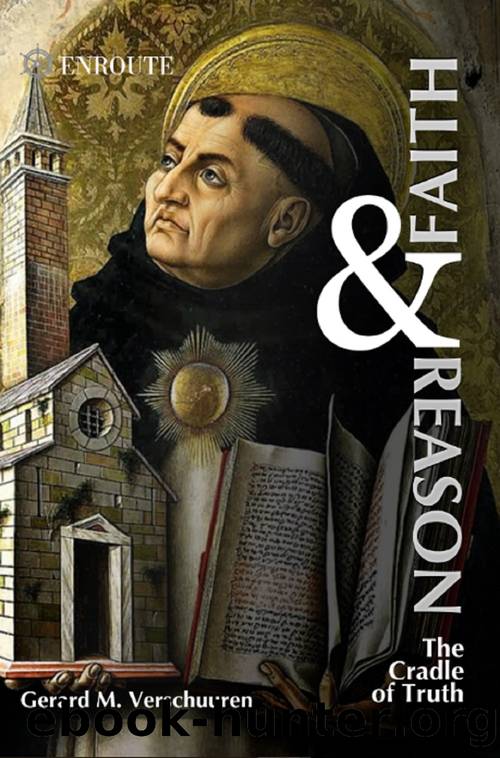Faith and Reason: The Cradle of Truth by Verschuuren Gerard

Author:Verschuuren, Gerard [Verschuuren, Gerard]
Language: eng
Format: epub
Publisher: En Route Books and Media, LLC
Published: 2017-09-18T00:00:00+00:00
Providence
The âGod of reasonâ has sometimes been caricaturized as the God of deism. In the 17th and 18th centuries, during the Enlightenmentâthe âAge of reasonââdeism became popular among intellectuals who, raised as Christians, believed in the one God of Natural Theology but rejected all forms of revealed religion (theism). The God of deismâânatureâs Godââhas often been described as a God who once made the world, but more like a watch-maker who makes a watch, lets it run its own course, and then abandons it to itselfâthe âhands-offâ approach of an absent landlord, so to speak. This means that the God of deism does not intervene in the affairs of the world, and contrary to what is maintained in theism , no supernatural events or miracles can be ascribed to God. However, this is not necessarily the way Natural Theology sees it. If God were to take away for one instant his sustaining power, the entire creation would at once fall back into nothingness. So everything fully depends on God, even in Natural Theology. God preserves and governs the world, so nothing happens without the will or permission of God.
Nevertheless, the âGod of Faithâ takes us much further than the âGod of reason.â What Faith âaddsâ to reason is that the âGod of reasonâ has not remained utterly hidden for us but actually âspokeâ to us and still keeps âspeaking.â He is actively involved with his creation and with each one of his creatures. The âGod of Faithâ is the God of history who is intimately and perpetually involved with the affairs of humanity. He is not a God merely of the past but also of the present and the future. He is the eternal âI AM â (Ex. 3:14), the One âwho is and who was and who is to comeâ (Rev. 1:4).
This is how Divine Providence is understood: as care exercised by God over the Universe, his foresight and care for its future. Though the term itself hardly occurs in the Scripturesâor at least it is translated in various waysâthe closest comparison can be found in Genesis 22, when Abraham takes his son Isaac to a mountain so as to sacrifice him to the Lord, and then is asked by his son, âwhere is the lamb for the burnt offering?â Abraham answers him âGod will provide for himself the lamb for the burnt offering, my son.â And then, when the angel of the Lord stops him from sacrificing his son, Abraham finds a ram in the thicket. So he calls this place âThe Lord will provideââwhich means, God will take care of it.
That passage reflects basically how we understand Divine Providence: God, by his providence, is in charge of all that happens to his creation and to all its creaturesâhe takes care of everything. His providence is not just some general oversight of the world, leaving the details worked out by someone or something else. Rather, he is behind every detail of the Universeâfrom the falling of a sparrow to the number of hairs on your head.
Download
This site does not store any files on its server. We only index and link to content provided by other sites. Please contact the content providers to delete copyright contents if any and email us, we'll remove relevant links or contents immediately.
Christian Ethics by Wilkens Steve;(854)
Christian Ethics for a Digital Society by Kate Ott(778)
Fearfully and Wonderfully Made by Philip Yancey & Paul Brand(769)
God and the Multiverse by Victor J. Stenger(672)
Numbers by Ronald B. Allen(632)
How to Read Slowly by James W. Sire(613)
Christian Ethics: An Introduction to Biblical Moral Reasoning by Wayne Grudem(597)
The City of God by Saint Augustine & Marcus Dods(577)
Monastic Archaeology by Unknown(564)
Morality by Jonathan Sacks(564)
The Technological System by Jacques Ellul(543)
Amish Grace by Donald B. Kraybill & Nolt Steven M. & Weaver-Zercher David L(531)
Death of the Doctor by Unknown(525)
The Disabled Church by Rebecca F. Spurrier;(521)
Jesus: A New Vision by Whitley Strieber(518)
Children of Lucifer; The Origins of Modern Religious Satanism by Ruben van Luijk(505)
Critical Writings by Joyce James;(499)
Redeeming Sociology by Vern S. Poythress(485)
The Church in the Early Middle Ages by G.R. Evans(474)
